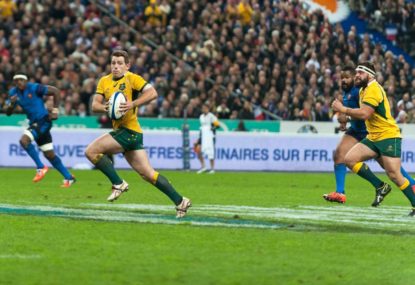Australian Rugby has effectively turned a new page by signing 25-year-old Wallabies and Waratahs flyhalf Bernard Foley to a three-year contract extension.
The ARU have announced that as part of the agreement, Foley will also be entitled to spend two seasons playing Rugby in the Japanese domestic competition.
On the plus side, the contract ensures that Foley is available for the Wallabies and the Waratahs until the end of 2018.
One question is just how available?
Without knowing the details of the agreement and the 2016-2018 match schedules, it is difficult to answer this question with certainty.
The first game of the Japanese rugby season in 2014 began on 23rd August 2014 with the All Japan Championship Final taking place on 28th February 2015.
In Australia Round 1 of the Super Rugby competition began on February 13, 2015. The Super Rugby Final is scheduled for July 4, 2015.
The 2015 Rugby Championships begin on Saturday 18th July 2015 and finish on Saturday 15th August 2015.
A better guide, however, could be the 2014 Rugby Championships, which took place between 16th August and 4th October
Depending on the schedule for 2016, one can see why Cheika is supportive of the idea of flexible contracts in limited circumstances.
Given the fact that the ARU has been in a precarious financial position (which should see significant improvement in 2016), it is also understandable why CEO Bill Pulver has been flexible in his approach to retaining what the ARU sees as key currently contracted Wallabies.
Since his appointment as CEO in 2013, Pulver has been in the unenviable situation of trying to work from the top down, with very limited resources, rather than the preferred position of being cashed up enough to be able to invest in grassroots and strengthen Australian rugby’s base. Given that professional rugby is the income engine for the code, it is understandable that the short term focus has been at the pointy end of rugby.
However, if the ARU receives an additional reported $15.5 million a year from the new Fox/Ten deal beginning in 2016, it will have the opportunity to address this imbalance between grassroots and professional rugby.
The fact that the SANZAR broadcasting rights are sold in US dollars, rather than the falling Australian dollar, is also a benefit, resulting in a significant increase in the rights values for the ARU.
While this expected increase is not the panacea for all the issues in Australian rugby, if wisely applied, the revenue from the new broadcasting deal should enable rugby to get back on its feet, to the extent that some much needed focus can be placed on the development of the game.
To his credit, Pulver has been able to get the National Rugby Championship off the ground during a very challenging period, without incurring any significant debts, and its continuation until at least 2020 is virtually assured with the new broadcasting deal.
So, the bigger question is whether or not there is a need for flexible contracts of the nature secured by Bernard Foley or whether the ARU should have stuck to its previous position of not selecting foreign-based players?
It seems with the advent of professional rugby, a lot of people consider professional sport to be simply be a business and as such, self-interest is the order of the day.
Now please don’t get me wrongm I do not blame Foley in the slightest for wanting to butter his bread on both sides. He has a short time window to maximise his earning capacity and he has capitalised on this. I have no doubt he also wants to continue playing for the Wallabies – who wouldn’t?
While Foley himself is understandably thrilled with the outcome, I am yet to be convinced that his reason for playing overseas is ‘ to experience a new culture and Rugby environment’ as stated by him.
Wallabies Coach Michael Cheika said “Flexible contracting is taken into consideration for exceptional circumstances, and I am confident that he will put his own well-being at the front of his priorities and thinking.”
Really? What a surprise.
So let’s call a spade a spade.
Bernard Foley wants to go to Japan because he can earn a mountain of money over there. Rugby players do not usually go to Japan for the cultural experience as many foreign players and coaches who have been over there will tell you. Nor do they go there to improve their rugby.
Foley has signed for the money. Good luck to him. So that takes care of the self-interest from the player’s point of view.
Self-interest cuts both ways, and from the ARU perspective, they no doubt see this as a win/win, given Pulver’s comment that the agreement allows the ARU to re-sign an important player it may have otherwise lost exclusively to an overseas-based club.
The self-interest of the ARU needs to represent the collective interest of the entire Australian rugby community, given that is who the ARU represents.
So will this decision benefit Australian Rugby in the long run or has it opened the floodgates to a turnstile of journeymen, who want to experience the culture of Japan and/or countries? And if so, is that a bad thing?





























































































